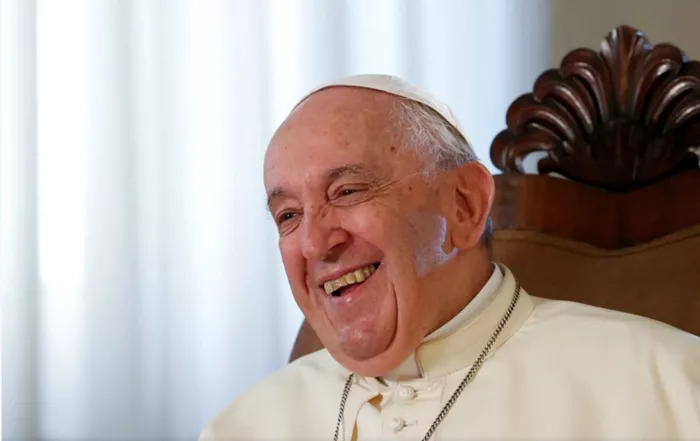Pope Francis has long been critical of Catholics who, in his view, focus on negativity and pessimism. He calls them “querulous and disillusioned pessimists” (Joy of the Gospel, No. 85) and echoes Jesus’ rebuke of religious leaders who boast about their piety. Jesus’ words, “Amen, I say to you, they have received their reward” (Mt 6:16), point to the danger of such self-righteousness.
Recently, however, Pope Francis has taken his message a step further. He has come to see humor not just as compatible with faith but perhaps essential to it. In a column for The New York Times, which is part of his upcoming book, he writes, “Those who give up their own humanity give up everything. When it becomes hard to cry seriously or laugh passionately, we are on a downhill slope. Anesthetized adults do no good for themselves, society, or the church.”
In his essay, Pope Francis shares jokes from two saints—Pope John XXIII and Pope John Paul II—as well as jokes about his own religious order, the Jesuits. Known for his love of folk sayings, the pope sees humor as a powerful remedy.
Several months ago, he invited comedians from the United States and other countries to the Vatican, praising their ability to “make people think critically by making them laugh and smile.” He explained that comedians play an important role in today’s world. “In the midst of so much gloomy news, you denounce abuses of power, give voice to forgotten situations, highlight injustices, and call out inappropriate behavior.”
Comedy, he noted, has the ability to shine a light on issues that demand attention. However, in an age where rage often dominates, the humor can sometimes feel sharp and bitter. Late-night comics, once a source of simple humor before bed, now often have a cynical edge. This scornful tone may leave the audience feeling more agitated than relaxed.
Perhaps what we need are comedians like Nate Bargatze or Jim Gaffigan, who focus on making us laugh at ourselves. There are many serious challenges in the world, but humor offers a soothing balm for the soul. In the Catholic tradition, laughter is also a recognition that we know there is a happy ending.
For me, humor has always been a part of life. I was lucky to grow up with a father who loved practical jokes, as well as the witty songs of Gilbert and Sullivan and the sharp humor of Tom Lehrer. I’ve always enjoyed reading the comics alongside the news and sports. Even now, before bed, I prefer a light comic strip like Pearls Before Swine or Zits to wind down, ensuring a smile before sleep.
Not every saint is known for their humor—St. Jerome, for instance, isn’t exactly known for telling jokes. However, Pope Francis reminds us that when we take ourselves too seriously, we risk losing our effectiveness as witnesses of joy in the Gospel.
During a meeting with comedians, Francis reminded them of the prayer for good humor written by St. Thomas More, one of the church’s most famous martyrs. The prayer ends with these words, which may serve as a good reminder to us all:
“Give me a soul that knows not boredom, grumblings, sighs, and laments, nor excess of stress, because of that obstructing thing called ‘I.’ Grant me, O Lord, a sense of good humor. Allow me the grace to be able to take a joke, to discover in life a bit of joy, and to share it with others.”

